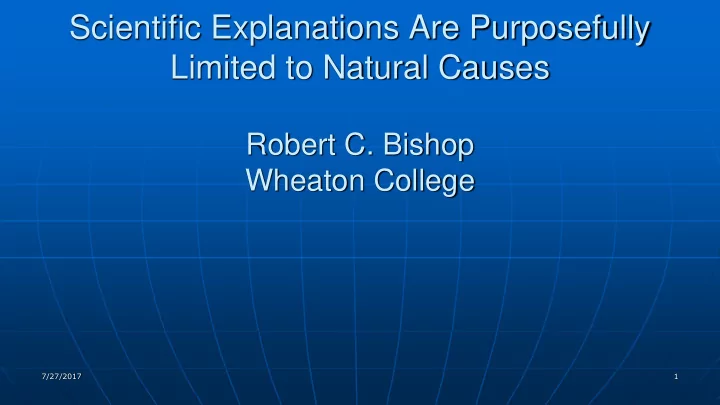

Scientific Explanations Are Purposefully Limited to Natural Causes Robert C. Bishop Wheaton College 7/27/2017 1
13 th -century natural philosopher Albertus Magnus Distinguished “between philosophy and theology on methodological grounds” “Albert pointed out that God employs natural causes to accomplish his purposes” “the philosopher’s task is not to investigate the causes of God’s will, but to inquire into the natural causes by which God’s will produces its effect” (Lindberg 2007, The Beginnings of Western Science , pp. 240-1) 7/27/2017 2
Congregational minister and geologist George Frederick Wright (1876) “We are to press known secondary causes as far as they will go in explanation of facts. We are not to resort to an unknown cause for explanation of phenomena until the power of known causes has been exhausted. If we cease to observe this rule there is an end to all science and of all sound sense.” (1882, Studies in Science and Religion , p. 74) 7/27/2017 3
Thomas Torrance (1913-2007) Divine and Contingent Order (1981/1998) 1. Ex nihilo creation Implies empirical & theoretical methods of inquiry appropriate for regular, repeatable natural phenomena 7/27/2017 4
Thomas Torrance (1913-2007) Divine and Contingent Order (1981/1998) 1. Ex nihilo creation Implies empirical & theoretical methods inquiry appropriate for regular, repeatable natural phenomena 2. Created being is contingent rather than necessary To explore contingent order requires taking the properties & processes of nature on their own terms 7/27/2017 5
Thomas Torrance (1913-2007) Divine and Contingent Order (1981/1998) “The paradox may be succinctly formulated in terms of two classic statements of Reformed theology: nothing can be established about contingence except through divine revelation...,and, divine creation requires us to investigate the contingent world out of its own natural processes alone; without including God in the given” (p. 26) 7/27/2017 6
Thomas Torrance (1913-2007) Divine and Contingent Order (1981/1998) 3. Creation’s contingent order has full reality Understanding genuine actors requires empirical & theoretical methods focused on the characteristics of natural processes 7/27/2017 7
Thomas Torrance (1913-2007) Divine and Contingent Order (1981/1998) 3. Creation’s contingent order has full reality Understanding genuine actors requires empirical & theoretical methods focused on the characteristics of natural processes 4. Since God created freely, the universe exists as a loving, gracious act God sustaining relationship to creation is one of love, not logical necessity 7/27/2017 8
Thomas Torrance (1913-2007) Divine and Contingent Order (1981/1998) “…knowledge of the created world and knowledge of God would be clamped together in such a way that we would derive knowledge of God necessarily and coercively from knowledge of the world, while knowledge of the world even in its natural operations would not be possible without constantly including God among the data” (p. 34) 7/27/2017 9
Thomas Torrance (1913-2007) Divine and Contingent Order (1981/1998) The Creator-creature distinction implies methods for studying nature must be designed w/ nature as the object of study in mind, not God The incarnation implies taking the creation seriously on its own terms calls for methods focusing contingent being 7/27/2017 10
Thomas Torrance (1913-2007) Divine and Contingent Order (1981/1998) Creation being made freely through divine love implies nature is only properly studied using methods focusing on its properties & processes Respect for God’s creation “to do it justice we are obliged to concentrate on it for its own sake” (p. 35) 7/27/2017 11
One Link between Torrance’s Argument & Scientific Practice Contextual negation Hypotheses share the same set of presuppositions forming the same context/assumptions Only the principle contents of the alternative hypotheses are negated Mutually exclusive/jointly exhaustive hypotheses 7/27/2017 12
One Link between Torrance’s Argument & Scientific Practice Logical negation Hypotheses are the complete opposite of each other w/out regard for context/assumptions of inquiry 7/27/2017 13
Contextual vs. Logical Negation H 1 : There is a cookie in the jar H 2 : There is no cookie in the jar 7/27/2017 14
Contextual vs. Logical Negation H 1 : There is a cookie in the jar H 2 : There is no cookie in the jar H 3 : It’s not the case that there is a cookie in the jar because God made it disappear H 4 : It’s not the case that there is a cookie in the jar because flying green space monkeys from Mars stole the cookie H 5 : It’s not the case that there is a cookie in the jar because the cookie spontaneously evaporated 7/27/2017 15
Recommend
More recommend